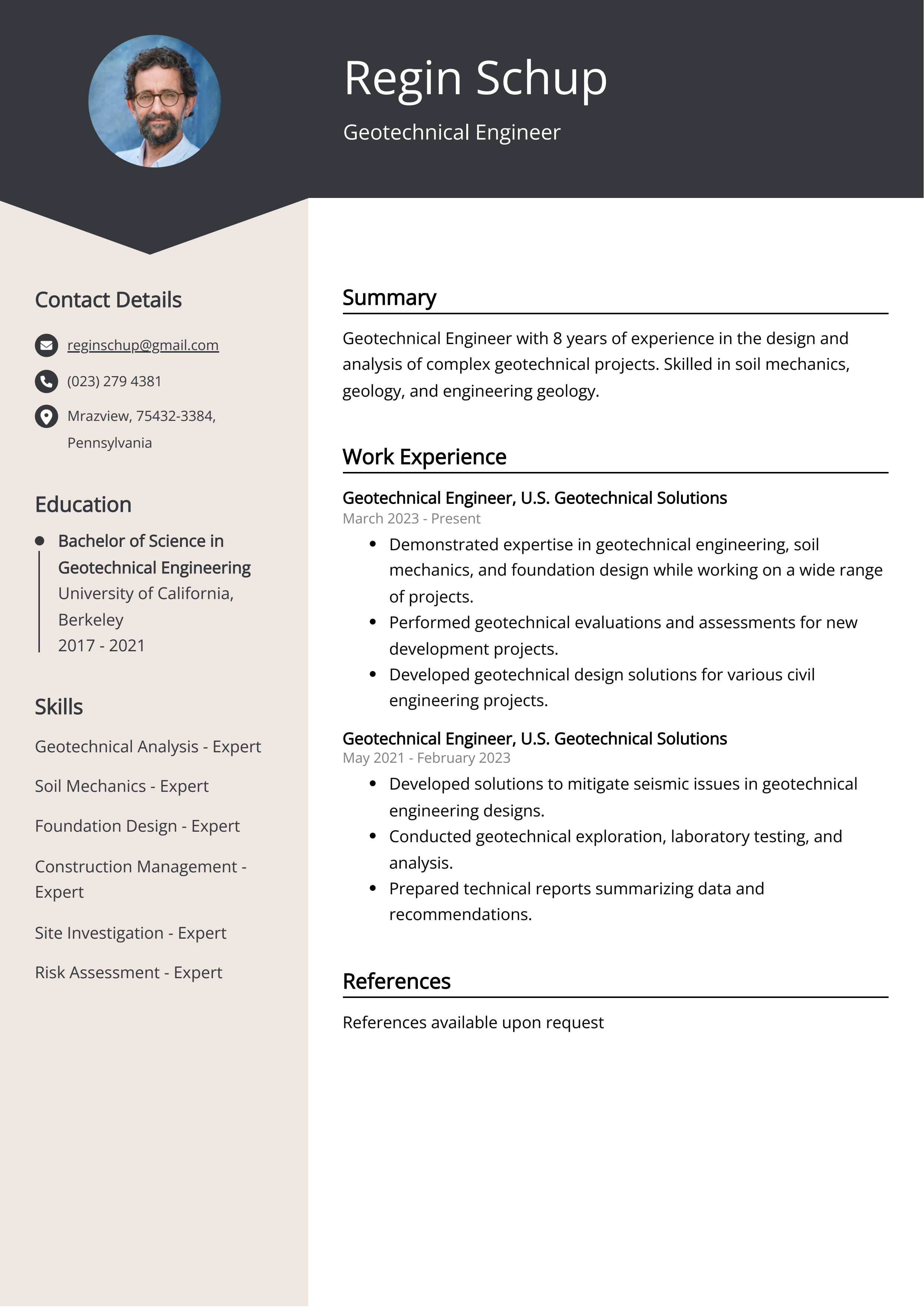Geotheta for Beginners
Table of ContentsSome Known Factual Statements About Geotheta The smart Trick of Geotheta That Nobody is Talking AboutIndicators on Geotheta You Need To KnowSome Known Incorrect Statements About Geotheta Geotheta Fundamentals Explained

They perform site investigations, gather examples, execute laboratory examinations, and analyze data to examine the viability of the ground for building and construction jobs - Consulting Engineer. Based upon their findings, geotechnical engineers provide recommendations for structure style, incline stability, maintaining frameworks, and reduction of geotechnical risks. They work together with other experts, such as designers, structural engineers, and construction teams, to guarantee that geotechnical considerations are integrated into the total job style and application
By evaluating the actions and residential or commercial properties of dirt and rock, they can determine potential geotechnical risks such as landslides, soil negotiation, or slope instability. Their competence helps avoid failures or crashes that can jeopardize lives and building. Below are some in-depth responsibilities and duties of a geotechnical designer: Site Examination: Geotechnical designers conduct site investigations to gather information on subsurface conditions.
They translate the data to understand the residential properties and habits of the soil and rock, including their strength, permeability, compaction qualities, and groundwater conditions. Geotechnical Evaluation and Design: Geotechnical designers examine the data accumulated during site investigations to analyze the security and viability of the site for building and construction jobs. They carry out geotechnical computations and modeling to assess variables such as birthing capability, settlement, incline stability, side planet stress, and groundwater circulation.
Get This Report on Geotheta
Foundation Style: Geotechnical engineers play a vital role in designing structures that can safely sustain the intended framework. They assess the dirt conditions and load needs to determine the ideal structure type, such as superficial structures (e.g., grounds), deep foundations (e.g (https://www.openstreetmap.org/user/geotheta)., stacks), or specialized techniques like soil renovation. They think about variables such as negotiation limits, birthing ability, and soil-structure interaction to establish optimal structure layouts
They evaluate construction plans, monitor site tasks, and conduct area evaluations to validate that the style suggestions are followed. If unpredicted geotechnical problems arise, they analyze the circumstance and provide suggestions for remediation or modifications to the design. Threat Analysis and Reduction: Geotechnical engineers examine geotechnical hazards and dangers connected with the job website, such as landslides, liquefaction, or soil erosion.

Collaboration and Communication: Geotechnical engineers function closely with various other professionals associated with a project, such as designers, structural engineers, and construction groups. Efficient communication and collaboration are important to incorporate geotechnical factors to consider into the general task style and construction procedure. Geotechnical engineers supply technical expertise, response questions, and make sure that geotechnical needs are met.
The 8-Minute Rule for Geotheta
Right here are some sorts of geotechnical engineers: Foundation Engineer: Foundation designers focus on designing and analyzing foundations for frameworks. They assess the soil problems, lots needs, and site qualities to figure out the most suitable foundation kind and style, such as shallow foundations, deep structures, or specialized methods like stack structures.
They review the elements influencing slope security, such as dirt properties, groundwater problems, and slope geometry, and create strategies to avoid incline failures and mitigate threats. Quake Designer: Quake designers specialize in examining and designing frameworks to hold up against seismic pressures. They examine the seismic risk of a site, evaluate dirt liquefaction capacity, and develop seismic layout standards to make sure the safety and durability of structures throughout earthquakes.
They perform area screening, collect samples, and analyze the accumulated data to identify the dirt residential or commercial properties, geologic developments, and groundwater conditions at a website. Geotechnical Instrumentation Designer: Geotechnical instrumentation engineers focus on monitoring and determining the behavior of dirt, rock, and structures. They mount and keep instrumentation systems that keep an eye on aspects such as soil settlement, groundwater degrees, slope motions, and structural variations to evaluate performance and provide very early cautions of possible issues.
The Basic Principles Of Geotheta
They perform examinations such as triaxial tests, loan consolidation tests, direct shear tests, and leaks in the structure examinations to gather data for geotechnical evaluation and layout. Geosynthetics Engineer: Geosynthetics engineers focus on the layout and application of geosynthetic products, such as geotextiles, geogrids, and geomembranes. They use these materials to enhance dirt stability, strengthen inclines, provide drain solutions, and control erosion.
They tend to be investigative people, which means they're intellectual, reflective, and investigative. They are interested, systematic, rational, logical, and logical. Some of them are also social, suggesting they're kind, charitable, participating, patient, caring, practical, understanding, tactful, and pleasant - Engineer of Record.
In the workplace setting, geotechnical designers utilize specialized software devices to execute estimations, develop styles, and examine information. They prepare reports, testimonial project specifications, connect with clients and staff member, and coordinate project activities. The workplace setup supplies a favorable environment for research study, analysis, and cooperation with other specialists included in the job.
Unknown Facts About Geotheta
They often see job websites to perform site examinations, analyze geotechnical problems, and collect data for evaluation. These check outs involve traveling to different areas, occasionally in remote or tough terrains. Geotechnical engineers might carry out dirt sampling, conduct examinations, and monitor building activities to guarantee that the geotechnical elements of the task are being applied correctly.
Geotechnical designers likewise operate in specialized geotechnical laboratories. In these facilities, they carry out experiments, perform tests on soil and rock examples, and assess the engineering residential or commercial properties of the products. Geotechnical research laboratory designers work extensively in these settings, taking care of testing devices, running tools, and recording information. They collaborate with other navigate here research laboratory staff to make sure exact and trustworthy testing results.